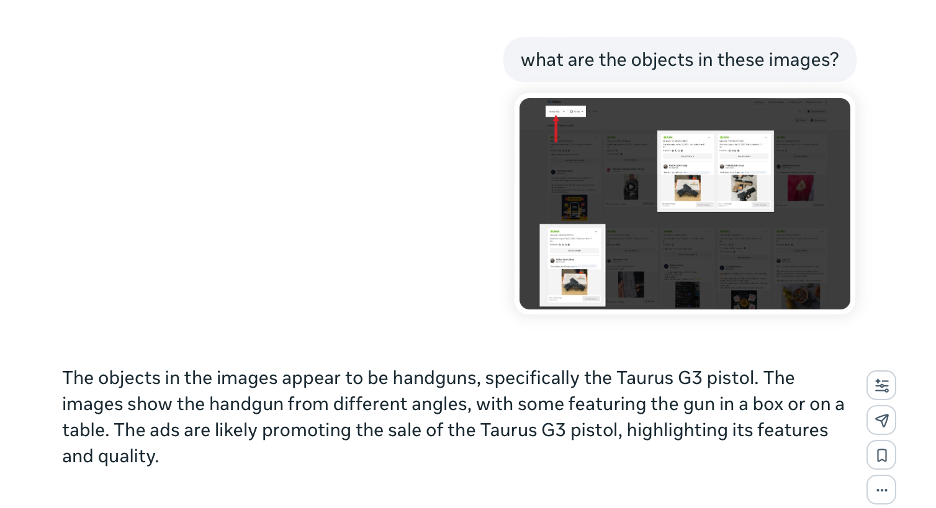Meta’s Image Detection and Child Safety Failures, Plus Age Assurance in the App Store
TTP's February 28th, 2025 Newsletter
Meta’s Conspicuous Double Standard on AI Image Detection
This week, TTP found several advertisements for illicit firearms that were approved to run on Meta platforms, despite the company’s policies against ads promoting “the sale or use of weapons, ammunition or explosives.” While Meta’s failure to stop weapons trafficking is nothing new, TTP decided to test the company’s public-facing AI tools by using them to analyze screenshots of the gun advertisements. Immediately, Meta’s AI Assistant identified the make and model of the pistol (Taurus G3) and determined that the screenshot contained advertisements “promoting the sale” of firearms.
The accuracy of this analysis is significant. Advertisements can contain images of guns without being used to sell them, but Meta’s AI Assistant was able to identify the purpose of the ads—something its internal ad approval systems are apparently unable to do.

These results echo a report by the research firm AI Forensics, which found that Meta automatically deleted screenshots of approved, sexually explicit advertisements from Facebook and Instagram when they were uploaded as organic posts. As the researchers note, these findings suggest that Meta has the technology to automatically detect violative content and has chosen not to enforce those standards on paid advertisements.
These lapses have consequences. In 2024, TTP identified over 200 paid advertisements for weapons, weapon accessories, and ammunition that Meta approved to run on its platforms.
Child Sexual Exploitation Continues Unabated in Spanish-Language Facebook Groups
On Wednesday, Tech Policy Press and the Latin American Center for Investigative Journalism published a series of articles revealing widespread child sexual exploitation in public Facebook groups—an issue that Latin American history professor Laura Putnam has covered since 2022. The groups share similar forms of sexualized “engagement bait,” which prompt children to disclose their ages or share photographs themselves, and are connected through Facebook’s recommendation systems. Instead of using Putnam’s reporting to build a safer platform, though, Meta allowed the groups to grow.
Speaking with Tech Policy Press, TTP Director Katie Paul pointed out that Meta had aggressively expanded in Latin America via its “Free Basics” program without making real investments in content moderation or platform safety. “Today, we see the very real consequences on real people—children—that come from an American tech corporation's unmitigated and unregulated growth.”
Apple Announces Age Assurance Tech for Devices
Yesterday, Apple announced “enhancements” to its child safety tools, giving parents the ability to share their child’s age range with app developers through a special API. Theoretically, this policy should prevent minors from accessing apps that contain inappropriate or harmful content—but only if Apple keeps a close eye on its App Store. Though the company claims to hold apps to “the highest standards for privacy, security, and content,” multiple independent investigations have found dangerous apps that were rated as appropriate for young users. Just three months ago, the Wall Street Journal reported that Apple had approved apps claiming to rate a child’s “attractiveness” using AI, along with a “spin the bottle” platform that facilitated conversations with strangers. The company also failed to remove apps used to create nonconsensual sexual deepfakes, and continues to host a Tinder-like app for teens that has been connected to a slew of sextortion cases.
Even if the App Store was safe, parental controls have very low adoption rates and will not protect children who are neglected or mistreated by their caregivers—conditions which are strong predictors for online child sexual abuse. Meanwhile, Meta is pushing for age verification at the App Store level, and called Apple’s update a “positive first step.”
What We’re Reading
Instagram Reels flooded with violent videos before Meta says it fixed error



